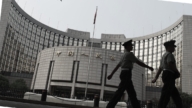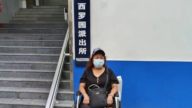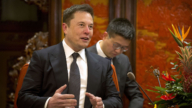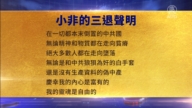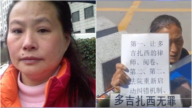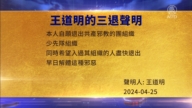【新唐人2011年7月27日讯】中国的贫富悬殊、社会不公、官民对立日趋恶化,中国人的怨气越来越大,已构成严重的社会和政治危机。“中国社会科学院”社会问题研究中心主任于建嵘最近指出,仇官、仇富、仇警是今天中国最基本的社会心态,中国社会将来一定会发生非常大的动荡。
在7月20号“第22届香港书展”开幕日,著名社会学者于建嵘教授发表演讲,综述了十年以来农民工人和市民维权的趋势,他提到:甚至连河南省的党校教师也罢课维权。
他指出,今年各地层出不穷的“群体性事件”,显示中共政权失去了民众的基本信任,星星之火就能轻易引发“群体性事件”甚至酿成骚乱。
于建嵘:“我告诉你们一个到大陆吵架的方法,只要你和人家吵架,你实在吵不过他了,你只要讲一句话你就赢了:‘你不就是个当官的么?’ 讲完之后,肯定好多老百姓围过来,‘当官怎么样了。’为什么?仇官、仇富、仇警是今天中国最基本的社会心态。”
《华尔街日报》引述“中国改革基金会”国民经济研究所副所长王小鲁的独立研究说,中国最富10%人口每年收入接近20200美元,是10%最穷人口的25倍。
“美林”公布的“2011全球财富报告”显示,2010年中国拥有百万美元以上资产的富豪达53.5万人,位列全球第四。“世界奢侈品协会”的报告指出,2012年中国将取代日本成为全球第一大奢侈品消费国。
中国有钱人狂购天价豪宅、钻石、名车、名表等奢侈品,而在通货膨胀的压榨下,普通劳动者的收入应付生存所需的柴米油盐和居住、医疗及子女教育,都捉襟见肘。
经济学家郎咸平教授表示,中国工人的平均工资一小时只有0.8美元,比非洲还低,位列全球最后一名,而中国工人一年的工作时间却是全世界最长的。
欧美甚至巴西的居民消费占GDP的比重都在60-70%以上,而中国居民消费仅占GDP的29%,郎咸平教授归因于普通中国人太贫穷。
另一方面,中共当局的财政收入却年年大幅度增长,今年上半年已超过5.6万亿,比去年同期增长31.2%。这就是海内外学者同声指责的“国富民穷”。
于建嵘:“前一个阶段它靠的是改革开放、什么政绩、GDP、什么发展的效率﹔最近一个阶段开始有人重回革命、要把原来革命的合法性又拿回来,这是共产党今天遇到的一个很大的问题。所以它今天很困扰,什么教育都没有用,你讲所有的理论提出来,都在老百姓那里变成了笑话。”
温家宝最近表示,不指望中国诸多社会不公问题在近期内能得到解决。原赵紫阳政治秘书鲍彤指出,胡温现在的任务是为下一届领导班子“创造条件”、“不制造问题”,但这种做法只会带来更多的麻烦。
目前,中共当局用于暴力维稳的经费已超过军费。于建嵘教授表示,中共为了“维稳”不惜牺牲民生和一切资源,甚至把文革那一套都拿出来了,实际上存在巨大的风险。
于建嵘:“我们需要政治改革,而且我认为最关键的问题,今天要保障公民的言论自由。假如我们今天每一个人都把宪法法律当成草纸,我们都怀着一腔的仇恨,我认为中国社会将来一定会发生非常大的动荡。”
《炎黄春秋》杂志副社长、原新华社高级记者杨继绳,最近出版《中国当代社会阶层分析》一书,引发很大反响。这本书在国内曾屡遭中宣部禁止,今年(2011年)终于解禁,公开发售。
杨继绳指出,改革开放以来,“蛋糕”最大的部分被付出少却有权的人占有,付出最多而没权的人只能得到剩余,这就造成了社会的仇官仇富现象。
新唐人记者李元翰、李月综合报导。
China’s Officials and Wealthy Hatred
Wealth gap, conflicts between officials and the public and
social injustice in China are getting worse.
People’ grievances have developed into
serious social and political crisis.
Yu Jianrong, director of Social Research Center
of Chinese Academy of Social Sciences (CASS),
recently pointed out that hatred toward officials, the rich,
and the police is becoming the base of mentality in China.
This can lead towards a mass scale social turbulence
in China.
On July 20, at “The 22nd Hong Kong Book Fair,”
renowned sociologist Professor Yu Jianrong gave a speech
about the trend of defending the human rights
of migrant workers and other citizens in the past decade.
He mentioned that even teachers of the CCP’s College
in Henan Province went on strike to defend their rights.
He pointed out that this year’s continuous “mass incidents"
are a reflection of people’s loss of trust in the CCP’s regime.
A small spark can lead to mass-scale incidents
and even riots.
Yu Jianrong: Let me tell you how to quarrel in China.
If you are not winning the argument, you just need to say:
“You are an official, so what?”
Once you say that, a lot of people would gather around and say:
“What’s so great about the officials?”
Why is that? The hatred toward the government, the rich
and the police is the base of the social attitudes in China today.
Wall Street Journal quoted Wang Xiaolu, a deputy chairman
of National Economic Research Institute
of China Reform Foundation in his independent research:
“The top 10% rich people in China have an annual income
25 times higher than that of the bottom 10%.”
According to Merrill Lynch’s 2011 World Wealth Report,
in 2010, China had 535,000 millionaires, the 4th in the world.
World Luxury Association (WLA) reported that in 2012,
China is expected to take over Japan to be the #1 country
in consumption of luxury goods.
Rich people in China acquire expensive mansions, diamonds,
cars, watches and other luxury goods.
Ordinary workers, facing inflation, even have a hard time
to afford daily necessities, health care and education expenses.
Economist and professor Lang Xianping indicated that
the average hourly salary of Chinese workers is $0.8,
lower than that in Africa, and the lowest in the world;
but the Chinese workers’ working hours are
the longest.
In Europe and Brazil, consumption-GDP ratios are above 70%,
while in China it is only 29%.
Professor Lang attributed that to
the poverty of ordinary Chinese people.
Meanwhile, the CCP government revenue grows steadily,
with H1 2011 reaching $5.6 trillion, up 31.2% from 2010.
This “wealthy government – poor people” phenomenon
in China is being criticized by overseas scholars.
Yu Jianrong: Previously the CCP relied on the reform,
the so-called performance, GDP and development efficiency.
Recently, some people wanted to return to the revolution,
and take away the CCP’s legitimacy.
This is CCP’s problem of today.
It is very troubled and its so-called ‘party education’ is useless.
All the theories they put forward are jokes to the people.”
CCP’s Premier Wen Jiabao recently said, he does not expect
the social injustice to be resolved in the near future.
Bao Tong, former political secretary of Zhao Ziyang,
(an ex-CCP leader but was sympathetic to the students in 1989),
pointed out that Hu Jintao and Wen are “creating conditions"
for the next leadership, but they actually bring more trouble.
Currently, the CCP’s expenditures on stability maintenance
via violence has surpassed China’s national defense funding.
Professor Yu said that the CCP, in order to “maintain stability,"
uses all the resources at the expense of people’s livelihood,
just like it did during the Cultural Revolution.
In fact,
there is a high risk.
Yu Jianrong: We need a political reform.
The key issue is to safeguard people’s freedom of speech.
If everyone regards the law as waste papers and we have hatred,
there will be mass turmoil in China in the future.”
Yang Jisheng,
VP of The Yanhuang Chunqiu Magazine
and former senior reporter of Xinhua News Agency,
published “China’s Contemporary Social Class Analysis.”
The book had great repercussions and was banned
multiple times by the Ministry of Central Propaganda in China.
Its ban was finally lifted in 2011.
Now it is available for sale.
Yang points out that since China’s reform and opening up,
the biggest part of the “pie” belongs to a small number
of people with power, who did not contribute much for it.
Those who work hard for it do not get any,
and this has resulted in hatred of the officials and the rich.
NTD reporters Li Yuanhan and Li Yue





